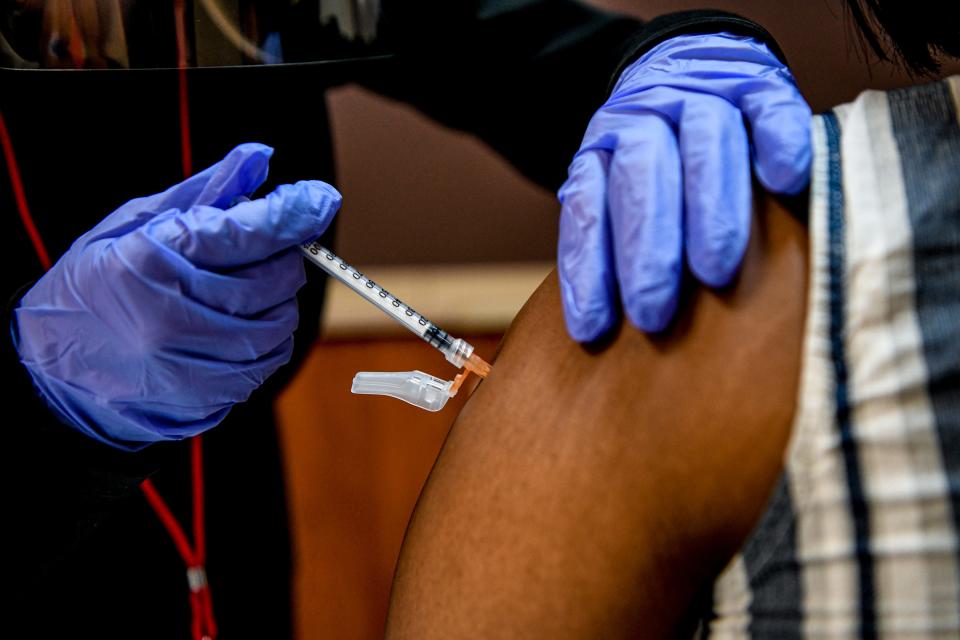Weeks after 'nightmare' COVID mutant XBB found in Florida, cases still falling
- Oops!Something went wrong.Please try again later.
The so-called "nightmare" coronavirus mutation fueling a surge of infections in Singapore has been found in Florida, but weeks after its discovery here, a statewide COVID-19 wave has yet to emerge.
A COVID test conducted Oct. 5 detected the XBB strain of the coronavirus' omicron variant in Florida, according to the result published Thursday by the worldwide GISAID initiative, a group dedicated to rapidly sharing coronavirus data.
XBB has been called the "nightmare" variant in some news reports because of its ability to penetrate immunity built by COVID vaccines. It is a combination of omicron offshoots BA.2.10 and BA.2.10.75, scientists have said.
Shots will cost: New omicron subvariants starting to grow in Florida, but soon booster shots won't be free
Surgeon general: Doctors rip basis of Florida Surgeon General Ladapo's latest anti-COVID vaccine advice
Frank Cerabino: Florida's anti-vax Surgeon General Dr. Joseph Ladapo finds ally in convict podcaster Steve Bannon
XBB has driven a wave of COVID cases in Singapore over the past month that appears to have peaked almost two weeks ago. Health officials in the Asian city-state of 5.6 million logged an average of more than 8,000 cases daily in mid-October, data collected by Johns Hopkins University shows.
That's about 1,000 less than what was reported during the worst of the Singapore's summer surge driven by other omicron subvariants.
Cases still going down 3 weeks after new mutant is found in Florida
Yet more than three weeks after viral surveillance company Helix OpCo discovered XBB in Florida, COVID cases continue to decline. The company did not identify the county in which the case was discovered, nor did it reveal basic information about the infected person, such as their age range or gender.
The state's viral case count grew by 10,150 in the week ending Wednesday, the fewest since early April, the latest data from the U.S. Centers for Disease Control and Prevention shows.
It is not yet clear how effective the latest Pfizer and Moderna vaccines are at fighting XBB or other omicron subvariants. Those vaccines were federally approved in late August and designed to fight the BA.4 and BA.5 omicron offshoots.
The vaccines from 2020 are built for the original coronavirus found in Wuhan, China. BA.4 and BA.5 more closely resemble XBB and BQ subvariants that have emerged nationwide since summer.
Just 7.3% of Americans have gotten the shots, the CDC reported Friday. The federal agency does not publish how many Floridians are up to date, nor does the Florida Department of Health.

Hospitals statewide tended to 1,130 COVID-positive patients Friday, the U.S. Department of Health and Human Services reported, on par with levels from before the summer surge in Florida driven by omicron subvariants.
Sewage virals creeping up in Palm Beach, Seminole counties
Most sewage readings across Florida continue to show flat or declining numbers of coronavirus particles in wastewater.
Sewage treatment facilities in Miami-Dade, Hillsborough, Pinellas and Orange counties show falling viral concentrations, according to Boston-based Biobot Analytics, which collects wastewater samples from across the country.
Seminole and Palm Beach counties, however, have found slowly rising levels of viral particles since mid-October.
Florida's COVID death toll grew by 265 people in the week ending Wednesday, the latest CDC data shows, less than half the weekly level from August and on par with fatal statistics from June.
Deaths can take weeks to process and be entered into official records.
COVID has infected just under 7.2 million Florida residents, the CDC says, excluding an untold number of cases discovered by at-home tests.
The disease has killed at least 82,170 people statewide, though state health officials exclude out-of-state residents who get infected here. The death toll also leaves out more than 3,000 victims found in 2020 by state auditors that the Health Department did not include.
Chris Persaud is The Palm Beach Post's data reporter. Email him at cpersaud@pbpost.com. Click @ChrisMPersaud and follow him on Twitter.
This article originally appeared on Palm Beach Post: COVID mutant XBB is new 'nightmare' borne of omicron found in Florida

